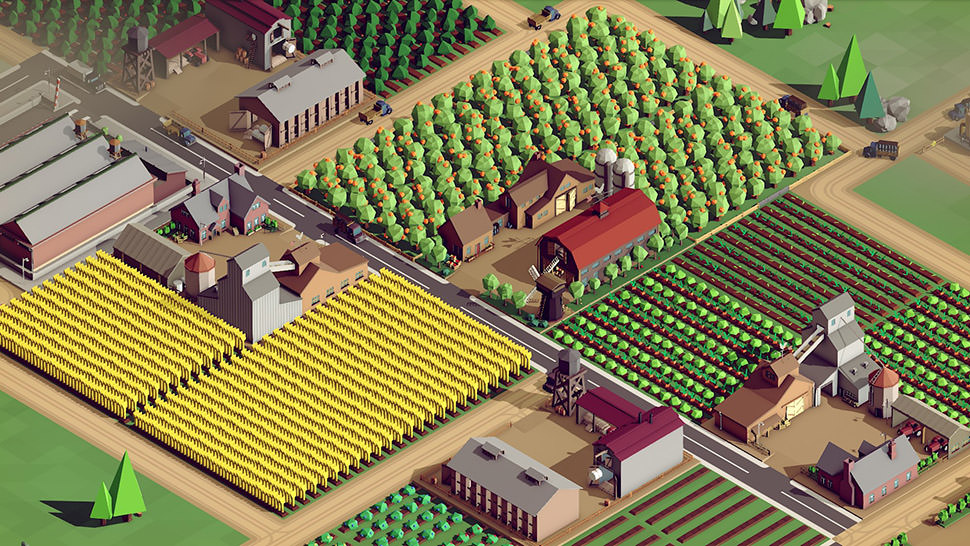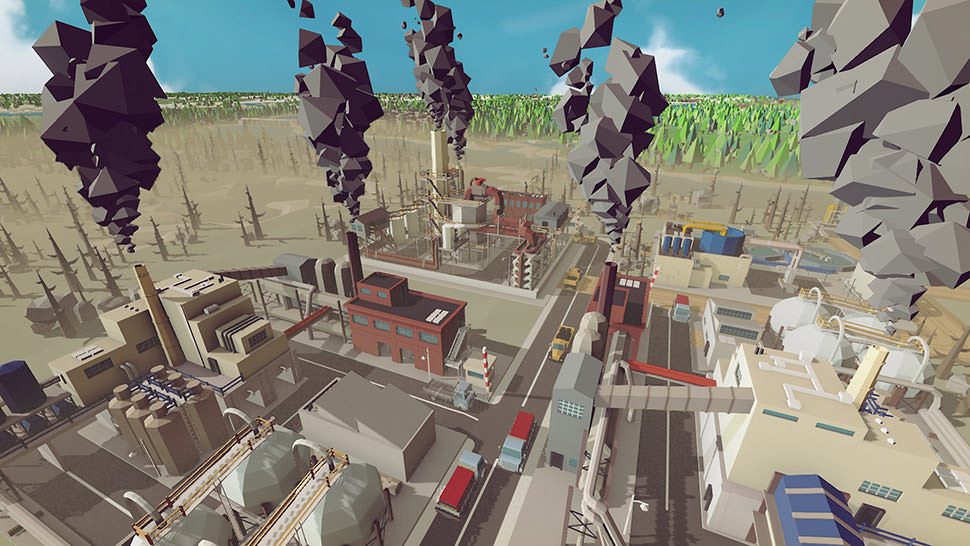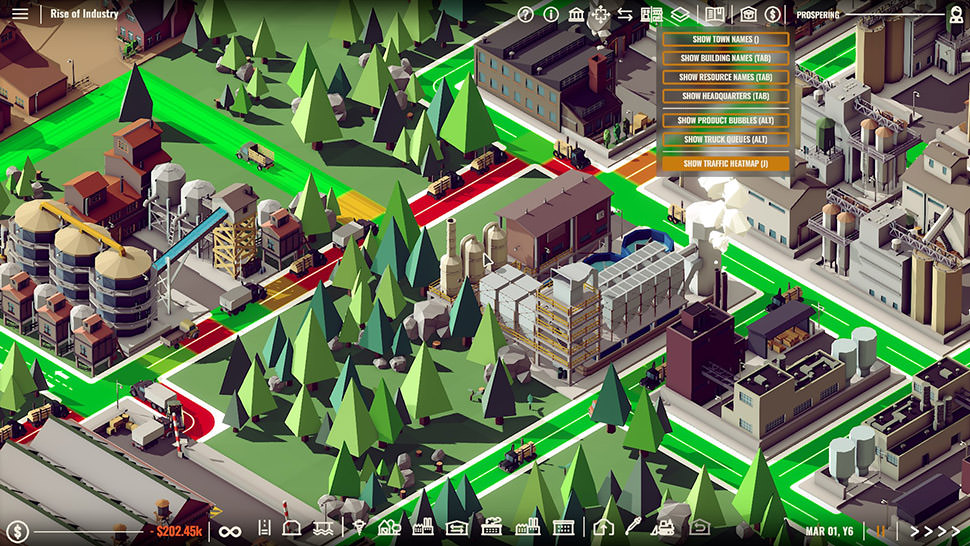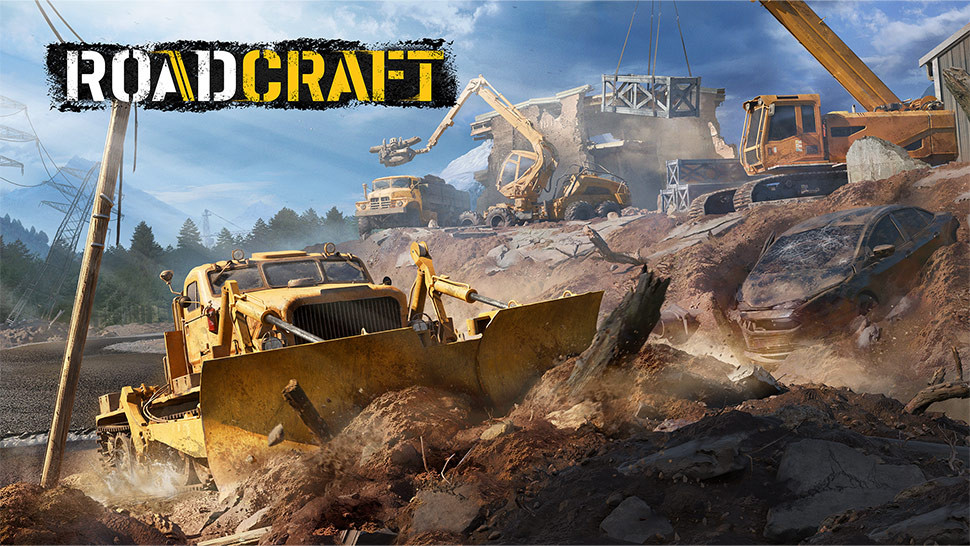Rise of Industry Review

 By Kevin Mitchell | May 6, 2019
By Kevin Mitchell | May 6, 2019
The popularity of tycoon games has undoubtedly waned over the years, but it wasn't too long ago that we were managing theme parks, railroads, cities, zoos, hospitals, airports, and more. In Steam Early Access for over a year, developer Dapper Penguin Studios tasks you with building and managing a growing industrial empire set across a procedurally generated world.
As an industrial simulation, you must figure out what the public wants to purchase by understanding supply and demand across multiple cities/towns. Not paying attention is essentially a swift death sentence for your business and chosen industry. Without the need for city building, the first step is figuring out what products are currently in demand, which leads you down the path of what crops to grow, items to craft, and how to properly maintain and supply all of the local establishments with the desired goods. On paper, the goal may seem quite simple, but in practice, things spiral out of control if you don't have the proper mindset required to keep a thriving business booming amongst the thirsty AI competitors.

There are plenty of options available, allowing you to customize the procedurally generated maps to your liking. There are preset regions, such as the United States, Spain, Germany, and more, influencing the naming conventions of the randomized locales, but Rise of Industry also lets you adjust the minuscule details, affecting the map size, number of rivers, the amount of AI, required upkeep/loan settings, and more. You can even enforce the US to start driving on the left side of the road. There are three key modes in the game: career, scenario, and sandbox. The latter of the three is a more relaxed experience, giving you unlimited funding and everything unlocked in the tech tree from the start. Scenarios provide the toughest challenges, featuring different objectives and constraints, while the core "career" experience feels almost the same as sandbox, but with tech tree and funding limitations in place.
As your new entrepreneurship journey begins, you must click on the heart of a city (town center), giving you a list of the various types of stores and products in demand. You may want to begin closer to a town that has a high amount of nearby natural resources that can feed your production. By matching the need for the requested goods, you get the general idea for the type of industry to carve out your empire, at least at first. For me, the most requested items were quite simplistic to produce: wool for the hardware stores and mutton for the farmers market. When viewing the menu for each store type, a single click displays the exact recipe for the selected items. For wool, you need water (1x) and wheat (1x) to sustain your sheep, which can be turned into sellable wool (2x) and mutton (1x). With this as a base, I built water siphons across the nearby river, with a farm next door to produce the necessary crop. Once you advance deeper through your tech tree, you may want to move to more complex (and multistep) production, such as furniture, potato chips, or automobiles.

Rise of Industry features a lengthy but mostly basic tutorial. It serves to set the groundwork, but I found it doesn't cover enough, leaving you directionless. For example, warehouses are the backbone of your industry, but I can't recall them ever being mentioned. It wasn't until I spoke with other team members who were playtesting the game that I understood the significance of sending all of your resources into these buildings for storage and distribution. As long as your harvesters and production buildings are within range, the entire process can be automated. If not, you need to manually transport resources to and from each of your premises, as well as to retail locations for profit. Thankfully, the game's unique low-polygonal visual style works well with the colorful UI panels and icons.
Events appear randomly and may assist or hinder your progress, such as skyrocketing the export price of a particular product for a set period. You may be tempted to send most or all of your water production out of state for massive profit, but that means that the rest of your factories won't have the necessary surplus of resources to continue production. This is why warehouses are vital, as you can ensure that everything you collect is correctly divided between multiple locations at the same time. You'll also need to keep an eye out on auctions, where you bid against the AI businesses for various things. If you aren't careful, they will also creep up against your territory in the blink of an eye, taking precious natural resources for themselves.
There are a lot of moving parts in Rise of Industry, and thankfully, the game has ample options to keep your business afloat. The budget overview panel gives you a quick breakdown based on profit and production. You can take that a step further and really dig into all the details you want based on specific products to ensure that your ROI (return on investment) stays healthy. If not, maybe it is time to shift your core business to a different product.

One thing that the game doesn't do all that well (besides the lacking tutorial) is letting you know when things are running smoothly. While there are ample pop-ups, icons, and warnings if things are broken, such as factories or farms not getting the required resources or if roads are not properly connected, it took some time to figure out if I was profitable. The game prioritizes monthly budgets, so if you are playing the game at the highest speed, you'll notice your money continually fluctuating, as it resets each month. I was initially confused as to why the numbers would drop from six-figure profit to negatives in a moment's notice (the cost to keep the lights on and your delivery trucks functioning) every month. Many of the advanced features the game offers aren't explained, so it will take a few games before you feel entirely comfortable. This seems to be a running theme with the game, and you can find links to user-created videos and the game's Discord directly in-game to assist you.
Simply Put
Rise of Industry is such a delight and a much deeper experience than I was expecting. Almost every aspect of your budding empire can be maintained and tweaked to your personal preference, although you'll have to give the customers what they want. Competition is fierce, and not only is the AI cutthroat, but you'll have to properly build a transportation network to ensure traffic doesn't slow down your profit margin. On top of that, pollution becomes a concern, and when you throw the random events and auctions into the mix, there is so much that you have to track to keep your business flourishing. While I may have built my empire on wool, nothing came between me and my desire to become the ultimate supplier of potato chips and berry pies. The game launched with Steam Workshop support, ensuring the game has a bright future due to the endless possibilities.
Note: Rise of Industry was reviewed on PC. A digital copy of the game was provided by the publisher/developer.




